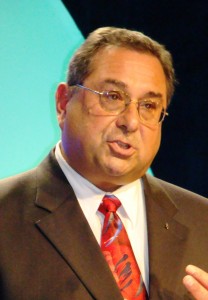Even though many in the auto industry acknowledge that the federal government’s 2009 bailout saved the domestic industry, they said it’s time for Congress and the White House to stop meddling in the industry.
Industry experts said during a session at the Management Briefing Seminars in Traverse City that the government’s grants have essentially chosen a powertrain technology rather than allowing automakers and consumers to figure out what works best.
“What we truly need from the U.S. government is a comprehensive energy policy to use as a guide,” said Tim Manganello, president and CEO of BorgWarner, a U.S.-based supplier of drivetrain parts such as turbochargers and transmissions.
The government has in recent years issued grants aimed at developing battery electric vehicles. But Manganello said other technologies, particularly diesel, also deserve consideration, not without self interest of course.
He said diesels have an uphill battle because of outdated negative stereotypes, higher taxes and the government’s push for electric vehicles. But he said that diesel might be a better solution for many Americans, who typically drive long distances where they excel, while electrics have shown poor performance in that area.
“The government should not be picking and choosing,” Manganello said.
He said that with current energy production capabilities, diesel results in a total of 334 grams per mile of C02 from “well to wheel.” That compares to 340 grams for pure electric and 322 for hybrids. A traditional gasoline-power car produces 476 grams per mile.
Those numbers show that the industry needs to do a better job educating consumers on the advantages of all powertrain choices, he said.
Manganello did not address the health issues surrounding diesel emissions or the refining issues that limit the amount of diesel that can be produced. Both of course have vexed policy makers.
Jim O’Donnell, president of BMW North America, agreed that the government has unfairly penalized diesel.
“If the government stopped interfering, (the U.S.) would be one of the biggest markets for diesels,” O’Donnell said.
Still, Manganello said the government’s push for fuel economy has helped.
“It’s a positive that the government has pushed us as an industry on fuel economy,” he said.


Highest efficiency: Diesel Battery Electric Hybrid. Also, highest cost.
In its defense, the .Gov needs to pick something to subsidize, because market forces alone are not strong enough to push the long term R&D that needs to happen.
Hydrogen was a good example–pie in the sky, always 10 years away, etc. At least BEV tech is here now, though expensive.